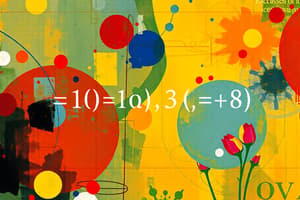Podcast
Questions and Answers
Which of the following are included in the examination coverage for General Mathematics? (Select all that apply)
Which of the following are included in the examination coverage for General Mathematics? (Select all that apply)
- Solve rational equations (correct)
- Differentiate functions
- Evaluate the given functions (correct)
- Perform addition, subtraction, multiplication, division, and composition of functions (correct)
The examination covers solving rational inequalities.
The examination covers solving rational inequalities.
False (B)
What type of functions are used to represent real-life situations according to the examination coverage?
What type of functions are used to represent real-life situations according to the examination coverage?
Piece-wise functions and rational functions
The examination includes solving _____ equations.
The examination includes solving _____ equations.
Which of the following is NOT a topic covered in the examination?
Which of the following is NOT a topic covered in the examination?
All counting numbers are whole numbers.
All counting numbers are whole numbers.
All integers are rational numbers.
All integers are rational numbers.
A number can be rational and irrational.
A number can be rational and irrational.
Every decimal number is an irrational number.
Every decimal number is an irrational number.
All real numbers are rational numbers.
All real numbers are rational numbers.
What are integers?
What are integers?
What is the operation rule for adding integers with the same sign?
What is the operation rule for adding integers with the same sign?
What is the result of multiplying integers with different signs?
What is the result of multiplying integers with different signs?
Define a function.
Define a function.
Which of the following is NOT a function?
Which of the following is NOT a function?
Flashcards are hidden until you start studying
Study Notes
Functions in Real-Life Situations
- Functions are utilized to model and represent various real-life scenarios.
- Piece-wise functions allow for the description of situations where different conditions apply.
Evaluating Functions
- Evaluating functions involves substituting specific values into the function to obtain the output.
Operations on Functions
- Basic operations include:
- Addition: Combining two functions to produce a new function.
- Subtraction: Finding the difference between two functions.
- Multiplication: Creating a product function from two input functions.
- Division: Dividing one function by another to determine their ratio.
- Composition: Combining functions where the output of one function becomes the input of another.
Problem-Solving with Functions
- Functions can be applied to solve practical problems, using their properties and operations to find solutions.
Rational Functions in Real Life
- Rational functions involve the ratio of two polynomials and can model complex scenarios in economics, physics, and other fields.
Understanding Rational Concepts
- Distinction between:
- Rational Function: A function expressed as the ratio of two polynomials.
- Rational Equation: An equation involving one or more rational functions.
- Rational Inequality: An inequality that includes rational expressions.
Solving Rational Equations
- Techniques for solving rational equations often include finding a common denominator, clearing fractions, and applying algebraic manipulation to isolate variables.
General Mathematics Overview
- Focuses on fundamental concepts in mathematics, including operations, relations, and number systems.
- Includes learning competencies such as solving integer operations, identifying functions, and expressing different relations.
Number Systems
- Real Numbers: Comprised of rational numbers (e.g., -3, 4/5) and irrational numbers.
- Complex Numbers: Combinations of real and imaginary numbers, e.g., (i).
- Rational Numbers: Can be expressed as a ratio (quotient), includes integers and fractions.
- Integers: Whole numbers including negative, zero, and positive values, e.g., (-5, 0, 7).
- Whole Numbers: Natural numbers plus zero, e.g., (0, 1, 2, 3).
- Counting Numbers: Natural numbers excluding zero, e.g., (1, 2, 3).
- Negative Numbers: Defined as integers less than zero, e.g., (-1, -2).
- Operations on Integers: Addition involves keeping the sign for same signs; subtraction involves subtracting magnitudes and adopting the larger sign.
- Multiplication and Division Rules: Same signs yield positive results, differing signs yield negative results.
Properties of Relations and Functions
- A relation consists of a set of ordered pairs defined by a domain and a range.
- Domain: The set of all possible input values, e.g., {1, 2, 3, 4, 5}.
- Range: The set of all possible output values, e.g., {1, 3, 5, 7, 9}.
- Types of Relations:
- One-to-One: Each element in the domain pairs with one unique element in the range.
- One-to-Many: One element in the domain pairs with multiple elements in the range.
- Many-to-One: Multiple domain elements pair with the same range element.
Functions Definition
- A function is a specific type of relation where each input from the domain is paired with exactly one output in the range.
- Non-functions have at least one input that maps to multiple outputs.
True or False Statements
- All counting numbers are whole numbers (True).
- All integers are rational numbers (True).
- A number can be both rational and irrational (False).
- Every decimal number is irrational (False).
- All real numbers are rational numbers (False).
Examination Instructions
- Encourages interactive participation through selecting and inputting answers based on integer operations and relations.
Studying That Suits You
Use AI to generate personalized quizzes and flashcards to suit your learning preferences.





